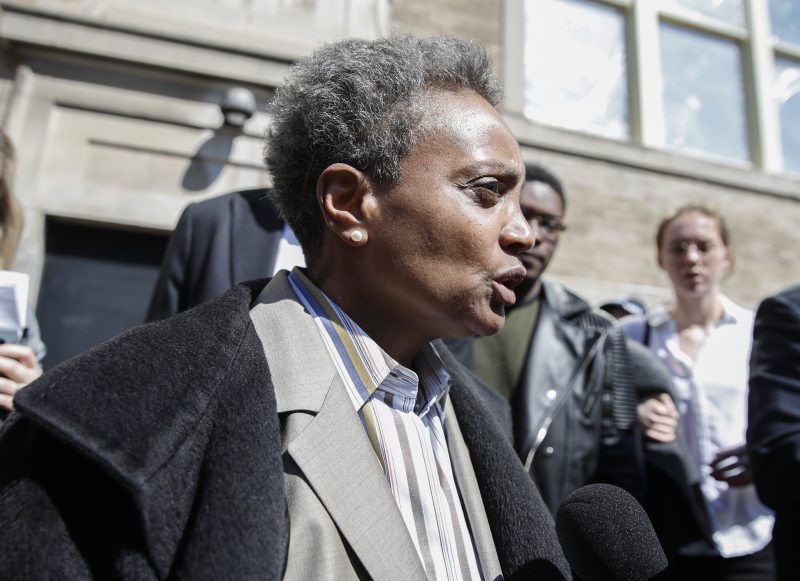Police under spotlight as Chicago’s new mayor prepares reforms
Lori Lightfoot’s election as Chicago mayor heralds a new era for a police department with a history of documented civil rights abuses and slow to change — even as it tackles a gun violence epidemic that has cost hundreds of lives each year (Kamil Krzaczynski)
Chicago (AFP) – Police officers in Chicago — struggling to hold the line in America’s most violent major city — now have a new boss who has openly criticized them for racial bias.
Lori Lightfoot — a former federal prosecutor — will take office next month with a list of reforms for the Chicago Police Department (CPD).
The political outsider’s election heralded a new era for a department with a history of documented civil rights abuses and slow to change — even as it tackles a gun violence epidemic that has cost hundreds of lives each year.
The openly-gay African American has called some officers racist and said police tactics have left minority communities feeling as if officers are “an occupying force.”
Lightfoot, 56, won the mayoral race Tuesday with a stunning 3-to-1 margin, in no small part due to her record of tough police criticism and a promise to shake up the establishment.
In 2016, Lightfoot headed a task force that put out a scathing report of the CPD’s tactics and recommended wide-ranging reforms.
“The Task Force heard over and over again from a range of voices, particularly from African-Americans, that some CPD officers are racist,” Lightfoot wrote.
“CPD is not doing enough to combat racial bias,” she concluded.
Lightfoot called for a number of changes, including a new civilian oversight office to keep track of police, teaching beat officers how to interact with traumatized minority youth, and ending a culture of “tolerance of lying” among officers.
– ‘Race does matter’ –
Scrutiny of the police comes at a time when Chicago is struggling with a gun violence epidemic.
More than 550 people were murdered last year — a reduction from an alarming spike two years earlier when it was more than 750, but still more than in the more populous cities of New York and Los Angeles.
Much of the bloodshed is related to gangs and the drug trade, and concentrated in predominantly African-American neighborhoods in the South and West.
But Lightfoot does not want police to simply crack down even harder to reduce crime.
Such tactics led to the types of abuses that left “many people feeling like the police are an illegitimate occupying force and we’ve got to change that around, because literally lives depend on it,” Lightfoot told NPR on Wednesday.
Residents in historically-segregated neighborhoods have long complained of economic decay that contrasts with a boom in the downtown area and other wealthy communities.
“The nature of policing has not adequately taken into account the segregation in our city and that race does matter,” Lightfoot told NPR.
Lightfoot has promised more economic investment to reduce the draw of crime for young people and a more informed police force that better understands the needs of minority communities.
– Documented abuses –
She also wants to reduce the distrust between police and minority communities that has developed over decades of well-documented abuses.
Judges in Chicago courts have exonerated numerous convicts — sometimes multiple people at a time — who were framed by crooked officers, tortured to extract confessions, or otherwise unjustly convicted.
“The city is now paying for it, both in terms of settlements to people who were wrongly incarcerated, but also in terms of mistrust of the police force,” Jim Bray, spokesman for the non-profit reform group Illinois Justice Project, told AFP.
Reforming police tactics could be a major shift for the department.
It has made some changes thanks to a consent decree — an agreement between the state of Illinois and the city’s police department to implement reforms, which was the result of a recent federal investigation which found civil rights abuses.
The department has improved transparency and increased community engagement.
But it has otherwise focused on reducing crime by employing new technologies and increasing the size of the force.
On Wednesday, the mayor-elect was non-committal about the future employment of the city’s current police chief Eddie Johnson, who is African American and has overseen the reduction in crime.
She promised to assess Johnson’s job performance after the summer.
“We have a lot of challenges to face, and he’s very well aware of it,” Lightfoot told CNN.
Disclaimer: Validity of the above story is for 7 Days from original date of publishing. Source: AFP.


